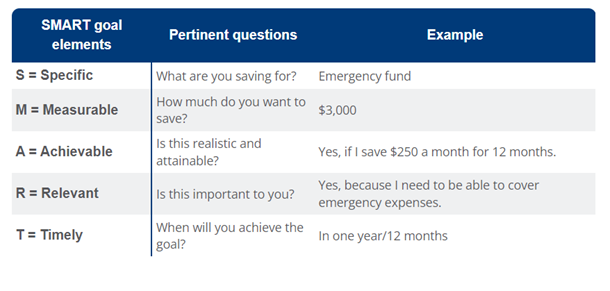
Financial Education
Setting SMART Financial Goals
In this article
- A SMART goal is a Specific, Measurable, Achievable, Relevant, and Time-bound objective of what you want to achieve
- Break down your SMART goal into smaller tasks for a step-by-step approach and make sure it’s well defined.
- Avoid setting unrealistic goals and neglecting the time-bound aspect of goal setting.
To achieve financial independence and long-term success, it’s essential to set financial goals. But setting vague or unrealistic goals can lead to frustration and disappointment. That's why it's important to set SMART financial goals – goals that are Specific, Measurable, Achievable, Relevant and Timely. Setting specific and measurable financial goals makes it easier for you to track your progress and take corrective steps when necessary. Achievable goals help you avoid frustration and prevent you from giving up on your plans. Relevant goals are linked to your overall financial aspirations and personal priorities. Timely objectives provide a clear timeline for achieving financial milestones, which helps to create a sense of urgency and motivation. Overall, SMART financial goals are an essential tool for financial planning.
SMART goal examples

If you’re looking to better manage your personal finances, setting financial goals is essential. Establishing specific objectives helps you prioritize your spending and make smarter decisions about where your money should be allocated. Regularly assessing financial goals also provides helpful feedback on how well any budgeting efforts are going and when adjustments need to be made. By clearly identifying your financial goals, you can improve your personal finance savvy and gain better control of where your hard-earned money goes.
To set SMART financial goals:
- Be specific about what you want to achieve. Establish clear objectives such as starting an emergency fund, debt reduction, increasing savings, or investing in a business venture. Define what you want to save or how much you’ll need to pay off a debt.
- Next, make sure your goals are measurable, meaning you can track your progress and monitor your success.
- Determine if your goals are achievable (realistically within your reach).
- Make sure your goals are relevant to your overall financial plan and align with your financial priorities.
- Finally, create a deadline for your goals that is challenging yet achievable. This will keep you motivated and focused and provide a timely target.
Three tips for achieving goals
- Break down your goals into smaller tasks. Big goals can be overwhelming but breaking them down into smaller tasks makes them more manageable. For example, if your big goal is to buy a house, you could break that down into smaller tasks, such as saving a specific amount for a down payment, browsing homes, choosing a real estate agent or broker, etc.
- Stay accountable. Share your goals with someone you trust, and report back to them regularly. This will help keep you accountable and provide you with the support and encouragement you need to succeed.
- Celebrate your successes. When you achieve a milestone or reach a goal, take the time to celebrate your success. Recognizing your accomplishments will motivate you to keep going and achieve more.
Common mistakes to avoid when setting financial goals
- Setting unrealistic goals. This sets you up for failure from the get-go. It's important to start with small, attainable goals and gradually work your way up to more ambitious ones. Don't give up if you can't meet the big goals right away.
- Not considering your budget. It is important to consider your current income and expenses before setting financial goals. Setting a goal that is out of your budget or doesn't consider your current financial status will only cause frustration and stress.
- Not having a plan to reach your goals. Setting financial goals is great, but how will you achieve them? Creating an actionable plan will help you stay on track and reach your financial goals more quickly.
- Not prioritizing your goals. It is essential to prioritize your financial goals so that you can focus on the most important ones first.
- Not tracking your progress. It's important to track your progress regularly to see if you are on track to meet your financial goals. This will help you to adjust your plans accordingly and stay motivated.
Tip: You can use various methods to track progress, including setting targets and benchmarks, implementing checklists and taking notes in a diary.
There are resources available online that you might find helpful for setting SMART goals, including goal-tracking apps. There are a variety of apps that can help you organize a plan for achieving your goals, set reminders and notifications for your goals, access data to help you identify patterns in your goal achievement, track your progress and provide feedback and support. SMART goal worksheets are also available to download or print from a wide range of sources.
With SMART financial goals in place, it becomes easier to create a budget, track progress and make informed financial decisions. Whether saving for a down payment on a house, paying off debt or considering investments for wealth-building, SMART financial goals provide a roadmap for success and a way to take control of your financial future.
Related content
Subscribe to our blog
Fill out the form below to sign up for our blog.
